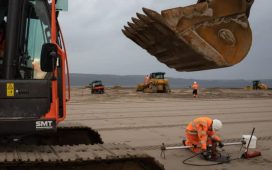Receive free Wind power updates
We’ll send you a myFT Daily Digest email rounding up the latest Wind power news every morning.
The UK’s plans to develop cleaner energy suffered a big setback after the government failed to attract any bids from offshore wind developers for its latest round of contracts for new projects.
No offshore wind projects won contracts in this year’s annual auction for subsidies, according to results published on Friday, after developers had warned that the government was not offering enough support to offset their rising costs.
It represents a significant setback to the UK’s plans to more than triple offshore wind capacity to 50 gigawatts by the end of the decade to help meet its legally binding target of net zero carbon emissions by 2050.
Ed Miliband, Labour’s shadow climate secretary, called ministers’ failure to secure any new sea-based, wind-generating capacity an “energy security disaster”.
The Climate Change Committee, the government’s independent climate adviser, has described offshore wind technology as the “backbone” of the future energy system.
Amid mounting criticism, one government official hinted that next year’s round, which opens in March, could offer a more generous guaranteed maximum price for offshore wind. “We are reflecting carefully on today’s results to make appropriate adjustments,” they said.
The government sought to highlight the success of other forms of renewable power generation that had secured contracts in the auction. It pointed to a “record” 95 projects using solar, onshore wind, tidal, and for the first time, geothermal technologies.
However, they represented just 3.7GW of generating capacity, the lowest level since 2017, and just over one-third of the capacity awarded last year, according to the trade body Renewable UK.
Dan McGrail, the trade body’s chief executive, said the offshore wind results should “set alarm bells ringing in government” and he urged minister to take “urgent action” to rebuild investor confidence.
Keith Anderson, chief executive of wind developer ScottishPower, said: “We had two projects eligible for the auction. We ended up not bidding either. The most important thing now is to focus on how to fix it.”
Sir John Armitt, chair of the UK’s National Infrastructure Commission, said the lack of offshore wind projects was “disappointing” and the government needed to “urgently learn the lessons from this process”.
Renewable energy projects in the UK are supported by the “contracts for difference” system, under which the government guarantees developers a fixed price for the electricity they generate over 15 years.
The system has helped the offshore wind sector grow rapidly over the past decade. The UK is world’s second-largest offshore wind market after China, and it supplied about 11 per cent of the UK’s electricity in 2021.
But rising costs for both turbines and labour globally led developers to urge ministers to increase the subsidies offered in this year’s auction.
In July, Vattenfall suspended work on one of the country’s biggest offshore wind farm projects, blaming surging costs of up to 40 per cent. The Swedish developer said the project was no longer viable under the price guaranteed in the contract it was awarded last year. Rising costs have also caused problems in other countries.
The official said the British government was acutely aware of the need to ensure value for money for taxpayers through its renewables auctions.
RenewableUK said the offshore wind projects eligible for this year’s round could have powered nearly 8mn homes and “saved consumers £2bn a year compared to the cost of electricity from gas”.
Tom Glover, UK country chair for energy giant RWE, which won contracts for several onshore wind and solar projects, said the government’s target of 50GW of offshore wind by 2030 was now at risk.
He said: “Never say never, but it would need serious government intervention to even make that remotely realistic now. We are running out of time.”
Graham Stuart, energy and climate change minister, said: “Offshore wind is central to our ambitions to decarbonise our electricity supply . . . we will work with industry to make sure we retain our global leadership in this vital technology.”
Climate Capital

Where climate change meets business, markets and politics. Explore the FT’s coverage here.
Are you curious about the FT’s environmental sustainability commitments? Find out more about our science-based targets here












